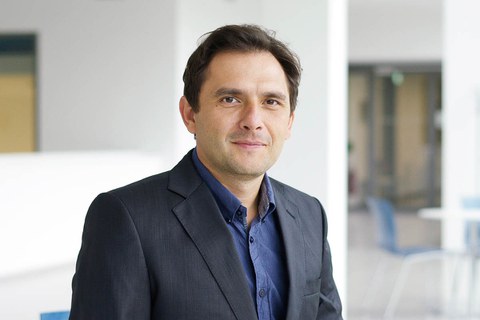Jun 14, 2021
DFG funds a collaborative project to explore the roadblocks to regeneration

Prof. Nikolay Ninov
A new collaborative project jointly led by Prof. Nikolay Ninov from the Center for Regenerative Therapies Dresden (CRTD) at TU Dresden and Dr. Jan Philipp Junker from Max Delbrück Center for Molecular Medicine in the Helmholtz Association (MDC) in Berlin will explore the molecular roadblocks preventing tissue regeneration. The work is supported by a generous grant within the Sequencing Costs in Projects program from the German Research Foundation (DFG).
As an organism develops, the cells originating from a fertilized egg have to differentiate into all the cell types necessary to build the organs in the adult body. Because the embryonic cells can develop into multiple cell types they are described as having high plasticity. As the cells become more and more specialized, they accumulate molecular roadblocks that limit the range of cells they can give rise to. The cell plasticity becomes more and more restricted as the organism develops and this decline continues with aging.
This limited plasticity is a particular challenge for tissue regeneration. A tissue is a community of different cell types that combine into an overarching function. To fully restore the tissue after damage, the remaining cells have to give rise to all the necessary cell types. In reality, this is rarely possible.
Mapping development and regeneration
Nikolay Ninov and Jan Philipp Junker would like to remove the roadblocks that prevent tissue regeneration. To do so, they plan to look on a large scale at individual cells that undergo transition into different cell types. On the one hand, the team will analyze cells in a zebrafish embryo and map the changes that occur as the organism develops and the cells gain specialization. On the other hand, knowing that the cell transitions are important for healing, they will carefully map processes during tissue regeneration in the adult zebrafish. Finally, they will compare the data from zebrafish with data from human tissue samples, where cell plasticity is very limited.
“Having mapped the development and regeneration at a single-cell level, we will analyze these two processes and look for similarities and differences between them,” explains Nikolay Ninov. “In this way, we plan to define the changes that limit the plasticity as the organism grows older. By overlaying the data from zebrafish with those from human samples, we will depict the roadblocks that make tissue regeneration a challenge in mammals.”
Identifying the roadblocks to regeneration is the first step to overcome them and promote a cellular makeover, i.e., trigger regeneration in tissues that so far were not able to regenerate. In the future, these insights can potentially be applied to stimulate regeneration of damaged organs and to reverse the age-related decline in organ healing and regeneration in humans.
Focus on the pancreas
As a proof-of-concept, the team will focus on development and regeneration of the pancreas. The pancreas is critical for maintaining blood sugar homeostasis and the loss of its function is linked to the onset of diabetes.
The two groups will use state-of-the-art methods to simultaneously measure old and new RNA in the same single cells, as well as map the regulatory elements of transcription during development and regeneration. Moreover, they will introduce genetic and epigenetic modifications to remove the roadblocks that prevent the differentiated cells from converting into the insulin-producing cells. The ultimate, long-term goal, is to translate the new insights into regenerative therapies for type 1 diabetes in humans.
Combining the expertise
It is not the first shared project of the Ninov and Junker groups. They have a record of successful collaborations based on a combination of expertise in cell differentiation in the pancreas of the Ninov lab’s at CRTD, with the expertise in single-cell genomic analysis of cell fate decisions of the Junker lab at the MDC Berlin. The DFG grant will fund postdoctoral and doctoral positions in the two groups. In addition, the funding will provide the necessary budget for the planned single-cell genomics.
The project is supported through the special DFG program – Sequencing Costs in Projects. Under this initiative, the DFG funds selected projects which plan to carry out the sequencing at the DFG-funded competence centers for next generation sequencing. This project will rely on the support from the DRESDEN-concept Genome Center, a joint sequencing center of the Deep Sequencing Core Facility at the Center for Molecular and Cellular Bioengineering (CMCB) of the TU Dresden and the Sequencing Facility of the Max Planck Institute of Molecular Cell Biology and Genetics (MPI-CBG).
